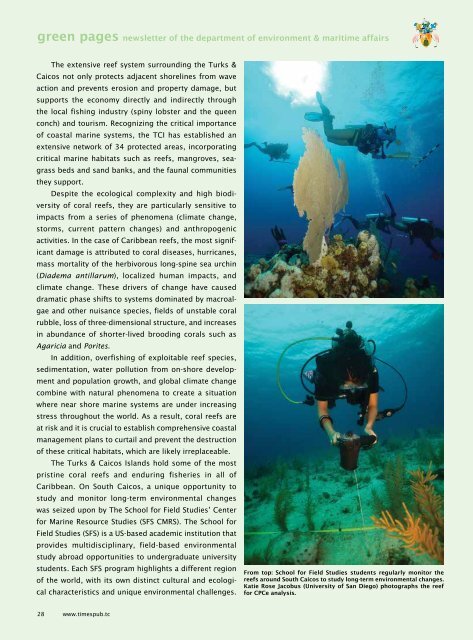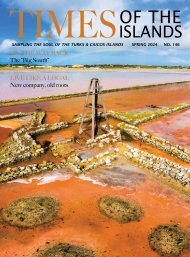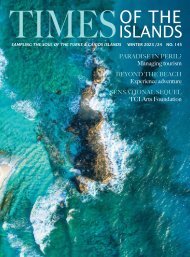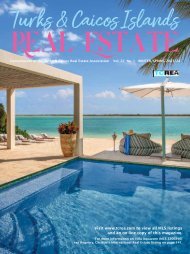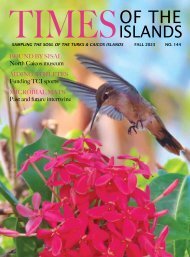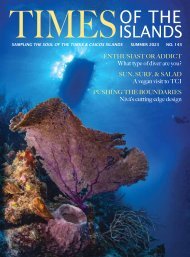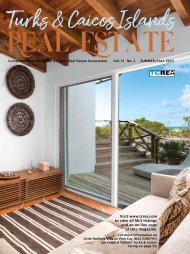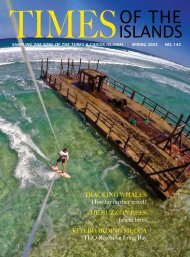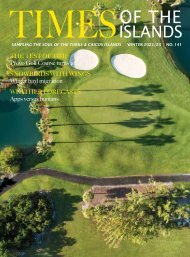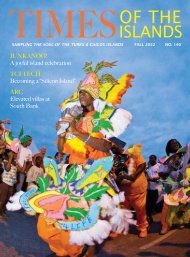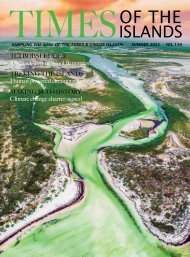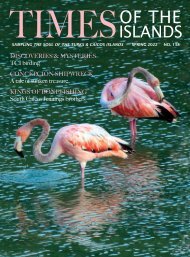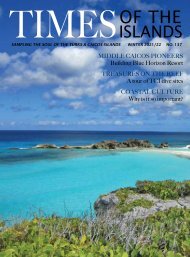Times of the Islands Summer 2016
Presents the "soul of the Turks & Caicos Islands" with in-depth features about local people, culture, history, environment, businesses, resorts, restaurants and activities.
Presents the "soul of the Turks & Caicos Islands" with in-depth features about local people, culture, history, environment, businesses, resorts, restaurants and activities.
Create successful ePaper yourself
Turn your PDF publications into a flip-book with our unique Google optimized e-Paper software.
green pages newsletter <strong>of</strong> <strong>the</strong> department <strong>of</strong> environment & maritime affairs<br />
The extensive reef system surrounding <strong>the</strong> Turks &<br />
Caicos not only protects adjacent shorelines from wave<br />
action and prevents erosion and property damage, but<br />
supports <strong>the</strong> economy directly and indirectly through<br />
<strong>the</strong> local fishing industry (spiny lobster and <strong>the</strong> queen<br />
conch) and tourism. Recognizing <strong>the</strong> critical importance<br />
<strong>of</strong> coastal marine systems, <strong>the</strong> TCI has established an<br />
extensive network <strong>of</strong> 34 protected areas, incorporating<br />
critical marine habitats such as reefs, mangroves, seagrass<br />
beds and sand banks, and <strong>the</strong> faunal communities<br />
<strong>the</strong>y support.<br />
Despite <strong>the</strong> ecological complexity and high biodiversity<br />
<strong>of</strong> coral reefs, <strong>the</strong>y are particularly sensitive to<br />
impacts from a series <strong>of</strong> phenomena (climate change,<br />
storms, current pattern changes) and anthropogenic<br />
activities. In <strong>the</strong> case <strong>of</strong> Caribbean reefs, <strong>the</strong> most significant<br />
damage is attributed to coral diseases, hurricanes,<br />
mass mortality <strong>of</strong> <strong>the</strong> herbivorous long-spine sea urchin<br />
(Diadema antillarum), localized human impacts, and<br />
climate change. These drivers <strong>of</strong> change have caused<br />
dramatic phase shifts to systems dominated by macroalgae<br />
and o<strong>the</strong>r nuisance species, fields <strong>of</strong> unstable coral<br />
rubble, loss <strong>of</strong> three-dimensional structure, and increases<br />
in abundance <strong>of</strong> shorter-lived brooding corals such as<br />
Agaricia and Porites.<br />
In addition, overfishing <strong>of</strong> exploitable reef species,<br />
sedimentation, water pollution from on-shore development<br />
and population growth, and global climate change<br />
combine with natural phenomena to create a situation<br />
where near shore marine systems are under increasing<br />
stress throughout <strong>the</strong> world. As a result, coral reefs are<br />
at risk and it is crucial to establish comprehensive coastal<br />
management plans to curtail and prevent <strong>the</strong> destruction<br />
<strong>of</strong> <strong>the</strong>se critical habitats, which are likely irreplaceable.<br />
The Turks & Caicos <strong>Islands</strong> hold some <strong>of</strong> <strong>the</strong> most<br />
pristine coral reefs and enduring fisheries in all <strong>of</strong><br />
Caribbean. On South Caicos, a unique opportunity to<br />
study and monitor long-term environmental changes<br />
was seized upon by The School for Field Studies’ Center<br />
for Marine Resource Studies (SFS CMRS). The School for<br />
Field Studies (SFS) is a US-based academic institution that<br />
provides multidisciplinary, field-based environmental<br />
study abroad opportunities to undergraduate university<br />
students. Each SFS program highlights a different region<br />
<strong>of</strong> <strong>the</strong> world, with its own distinct cultural and ecological<br />
characteristics and unique environmental challenges.<br />
From top: School for Field Studies students regularly monitor <strong>the</strong><br />
reefs around South Caicos to study long-term environmental changes.<br />
Katie Rose Jacobus (University <strong>of</strong> San Diego) photographs <strong>the</strong> reef<br />
for CPCe analysis.<br />
28 www.timespub.tc


